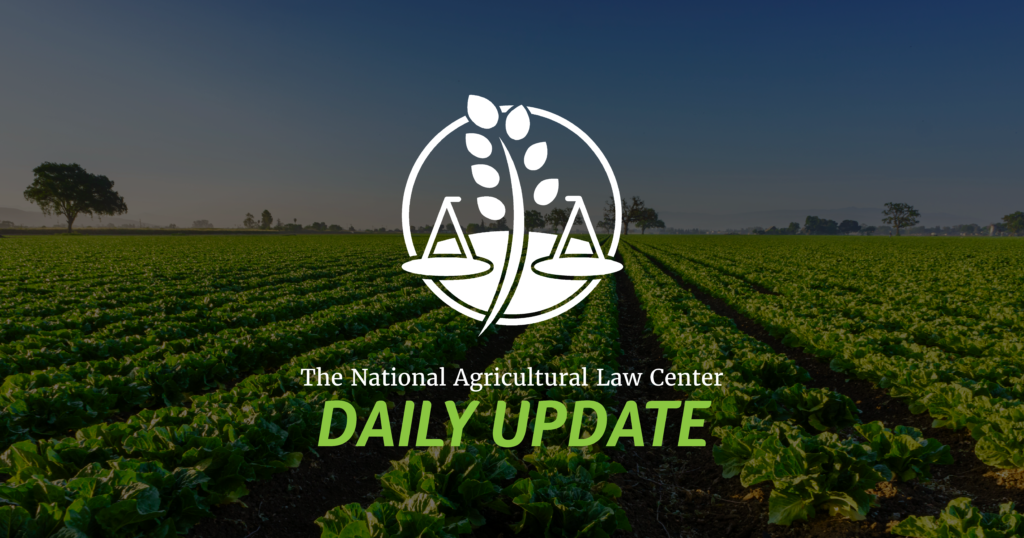A comprehensive summary of today’s judicial, legislative, and regulatory developments in agriculture and food. Email important additions HERE.
JUDICIAL: Includes conservation programs
In Round Lake Farms, LLC v. U.S., No. 2:21-cv-00354 (E.D. Wash. Oct. 11, 2022), the plaintiff claimed that a conservation project overseen by the National Resource Conservation Service deprived the plaintiff of its downstream senior water rights. The project was carried out as part of the Wetland Reserve Program, and involved the creation of new wetlands upstream from the plaintiff’s hay operation. According to the plaintiff, the new wetlands retained water and prevented the plaintiff from utilizing its senior water rights. In its lawsuit, the plaintiff argued that the defendant violated Washington state law by failing to obtain a water permit before impairing the plaintiff’s water rights. The court disagreed. According to the court, a private citizen cannot sue another party for failure to obtain water permits. That authority lies solely with the Washington State Department of Ecology. Because the Department stated that the defendant had not violated Washington state law, and because the defendant had not violated federal law, the court ruled in favor of the defendant and dismissed the lawsuit.
In Maine Forest Prod. Council v. Cormier, No. 22-1198 (1st Cir. Oct. 12, 2022), the appellate court upheld a preliminary injunction issued by a lower court that bars a Maine state law from going into effect. The law at issue is intended to prevent Canadian truck drivers from hauling logs within the state. Specifically, the law prohibits landowners with at least 50,000 acres of Maine forest land from hiring anyone who is not a “resident of the United States” to drive a vehicle “transport[ing] forest products” from one location to another within the state of Maine. Before the law took effect, the plaintiffs filed suit claiming that the law was preempted by the federal government’s H-2A visa program. The plaintiffs asked for the law to be enjoined while the lawsuit was conducted, which the district court granted, and the defendants now appeal.
In order for a court to issue an injunction for a state law on the basis that it might be preempted by federal law, the court must find that “the challenged state law stands as an obstacle to the accomplishment and execution of the full purposes and objectives of Congress.” The court explained that in order for a state law to present an obstacle to accomplishing the goals of Congress, the law must “confer rights or impose restrictions that conflict with federal law.” Here, the First Circuit found that the Maine state law attempts to restrict the rights granted by Congress to agricultural employers and agricultural workers under the H-2A visa program. Accordingly, the court upheld the injunction preventing the Maine law from going into effect.
REGULATORY: Includes FWS, USDA
FISH AND WILDLIFE SERVICE
Proposed rule to designate critical habitat for Chamaecrista lineata var. keyensis (Big Pine partridge pea), Chamaesyce deltoidea ssp. serpyllum (wedge spurge), Linum arenicola (sand flax), and Argythamnia blodgettii (Blodgett’s silverbush) under the Endangered Species Act. Info here.
Proposed rule to designate critical habitat for Sideroxylon reclinatum ssp. austrofloridense (Everglades bully), Digitaria pauciflora (Florida pineland crabgrass), Chamaesyce deltoidea ssp. pinetorum (pineland sandmat), and Dalea carthagenensis var. floridana (Florida prairie-clover) under the Endangered Species Act. Info here.
Proposed rule to list two Florida species, the Key ring-necked snake (Diadophis punctatus acricus) and the rim rock crowned snake (Tantilla oolitica), and propose to designate critical habitat under the Endangered Species Act. Info here.
UNITED STATES DEPARTMENT OF AGRICULTURE
Notice that USDA is seeking comments on how USDA should design and implement a program that provides financial assistance for producers and landowners determined to have experienced discrimination in the Department of Agriculture’s farm lending programs, as is required under Section 22007 of the Inflation Reduction Act of 2022. Info here.
